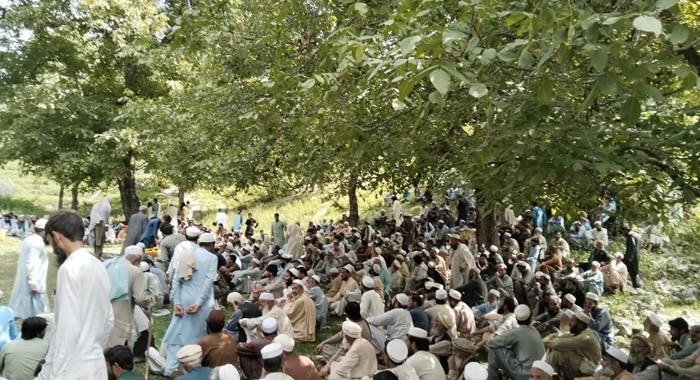
TTP Accepts Tribal Terms In Tirah As Anti-Terror Accords Expand Across KP
In a rare and potentially game-changing development, the banned Tehreek-e-Taliban Pakistan (TTP) has accepted all five conditions presented by the Bar Qamberkhel tribe during the second phase of peace negotiations in the volatile Tirah Valley of Khyber. Officials familiar with the process confirmed the agreement, sparking renewed hope for sustainable peace in a region plagued by decades of militancy.
The agreement emerged from a grand jirga held in the Bagh area of Tirah, led by influential tribal elder Haji Zaher Shah Afridi. The gathering drew widespread participation from tribal elders, religious scholars, madrassah and school students, and local community members, a clear sign of public determination to restore order and security.
The first round of talks took place on July 28, when the Bar Qamber Khel tribe tabled a five-point charter to the TTP. The group requested time to consult its central leadership based in Afghanistan. After internal deliberations, the TTP returned with a formal acceptance of all demands.
Also Read: Rallies Across KP Mark Kashmir Exploitation Day with Strong Solidarity Messages
The terms and conditions agreed upon are as follows:
1. Ensuring Public Safety: TTP fighters will not launch attacks on security forces from within residential or public areas, including homes and guesthouses. Any violation will be dealt with strictly.
2. End to Coercive Fundraising: The group will cease all forced collection of ushr, zakat, donations, or extortion. Any such activity will invite immediate punitive action.
3. No Interference in Civil Disputes: TTP members will stay away from personal, tribal, or community-level disputes and will not attempt to influence local jirgas.
4. Disciplinary Measures Against Miscreants: Any individuals whose actions bring shame to the tribe will face disciplinary proceedings under the authority of the tribal council, backed by community elders.
5. Accountability for Past Abuses: The tribe will submit a list of individuals allegedly killed, tortured, or abducted by the TTP in Khyber district. If found innocent, those responsible will be held accountable under Sharia law.
Addressing the jirga, Haji Zaher Shah Afridi hailed the development as a blessing and a testament to tribal unity.“This is not the victory of any one individual or jirga,” he stated,“but a collective success for an entire nation committed to peace. We must thank the Almighty for this breakthrough.”
The outcome is being described as an unprecedented instance of a militant group yielding entirely to tribal authority and could serve as a model for grassroots peacebuilding in other restive areas.
The Tirah agreement has been met with cautious optimism by tribal elders and locals, who stress the importance of ongoing vigilance and full enforcement of the terms agreed upon.
Momentum appears to be growing, as similar peace pacts have been reached in other tribal regions and southern districts of Khyber Pakhtunkhwa. According to officials, fresh agreements have been finalised in Lakki Marwat, Hangu, and Dera Ismail Khan, involving tribal leaders, local governments, and security agencies forming a united front against terrorism.
Key provisions of these new agreements include:
A total ban on providing shelter, food, or support to militants or their facilitators.
Complete prohibition on militant presence in populated areas.
Zero tolerance for individuals linked to terrorist activities.
These accords underscore a collective tribal commitment to support the state and promote peace through locally led mechanisms.
Officials involved in the talks view the wave of agreements as a turning point.“People are fed up. These pacts draw a clear red line, there will be no more tolerance or silent consent for terrorism,” a senior security official remarked.
Communities themselves are increasingly stepping up. Tribal elders have pledged to assist with monitoring, intelligence sharing, and enforcement of the new norms. In many areas, district peace committees have been assigned to oversee compliance and report any violations swiftly.
Together, these developments reflect a growing determination among tribal communities to reclaim their future, free from fear and violence.

Legal Disclaimer:
MENAFN provides the
information “as is” without warranty of any kind. We do not accept
any responsibility or liability for the accuracy, content, images,
videos, licenses, completeness, legality, or reliability of the information
contained in this article. If you have any complaints or copyright
issues related to this article, kindly contact the provider above.
Most popular stories
Market Research

- Solo Leveling Levels Up: Korean Billion-Dollar Megafranchise Goes Onchain With Story
- Freedom Holding Corp. (FRHC) Shares Included In The Motley Fool's TMF Moneyball Portfolio
- From Tracking To Thinking: Edgen's“Smart Portfolio” Brings Portfolio-Native Multi-Agent Reasoning To Asset Portfolios
- Cregis At FOREX Expo 2025: Connecting Forex With Crypto Payment
- Currency Relaunches Under New Leadership, Highlights 2025 Achievements
- Cregis At TOKEN2049 Singapore 2025: Unlocking The Next Frontier Of Adoption




















Comments
No comment